It’s a thing. It’s a perennial. It’s a recurring fascination. Like Daffodils springing up along our local highways in February, some Evangelical somewhere escapes the bonds of fundamentalism, gains new insights and clarity concerning what Jesus and the New Testament actually taught about this or that long-held, cherished doctrine or confession. Then, rather than move along down the road to enlightenment and into their newfound freedom from a dark, dank doctrinal prison, these initiates feel compelled to set the rest of us straight and usher Christ’s church into the hidden knowledge that will set the captives free from dogmatism (such a shame, too, because as Dorothy Sayers once observed The dogma is the drama).… Read the rest
Category: <span>Leadership</span>
Let’s face it, Jesus says some hard things. One of the most offensive statements in the Gospels is this winnowing word about families and disciples or followers of Jesus:
If anyone comes to me and does not hate his own father and mother and wife and children and brothers and sisters, yes, and even his own life, he cannot be my disciple. (Luke 14:26 ESV)
First, what is Jesus not saying? He isn’t barring or shutting anyone out of the Kingdom. Rather, He’s speaking the language of common sense along the same lines as this statement:
… Read the restNo one can serve two masters, for either he will hate the one and love the other, or he will be devoted to the one and despise the other.
Is there hope for a zombie church? The short answer is a resounding YES!
Look at these lavish promises Jesus holds out to churches He said were dead and/or in the process of dying — zombie churches:
… Read the restHe who has an ear, let him hear what the Spirit says to the churches. To the one who conquers I will grant to eat of the tree of life, which is in the paradise of God. (Revelation 2:7 ESV)
He who has an ear, let him hear what the Spirit says to the churches. To the one who conquers I will give some of the hidden manna, and I will give him a white stone, with a new name written on the stone that no one knows except the one who receives it.
So, if zombie churches are sucking the life out of Christian communities and if Jesus goes to war against a zombie church, does the average Christian fill some role in that unfolding judgment?
First, I want to reiterate that churches belong to Jesus and not us — He wars against zombie churches (Revelation 2:16) and we do not — period. If a death-blow falls on a zombie church it is Jesus, with His shocking white hair and flaming eyes Who comes against them by the word of His mouth — Jesus is the zombieslayer.
But, it’s plain throughout the Scriptures that each one of God’s people fills a role in the Church as members of His Body.… Read the rest
 Back in the 1980s, as a young Christian involved in the various youth movements of the time, it was very common to hear people speak of this or that church being “dead.” Entire geographical areas were also written off as lifeless: “the church back east is totally dead, man.” That was a common post-mortem among the 20 and 30-somethings in those days. It always struck me as wrong to speak of this or that church as “dead,” when there were certainly genuine born-again Christians involved — I mean, if some of the individuals in a church are abiding in the Vine, how can we say the entire fellowship is dead?… Read the rest
Back in the 1980s, as a young Christian involved in the various youth movements of the time, it was very common to hear people speak of this or that church being “dead.” Entire geographical areas were also written off as lifeless: “the church back east is totally dead, man.” That was a common post-mortem among the 20 and 30-somethings in those days. It always struck me as wrong to speak of this or that church as “dead,” when there were certainly genuine born-again Christians involved — I mean, if some of the individuals in a church are abiding in the Vine, how can we say the entire fellowship is dead?… Read the rest
I recently read a wonderful post by church-planter Joel Littlefield: Aren’t There Already Enough Churches? He asks and answers “one of the most common questions a new church planter might hear… ‘Aren’t there already enough churches in this town?’” Not all church planters or denominations engage in that level of reflection before going into a place where a vibrant Christian community already exists — they just get the call, parachute in, and get on with the work. Others simply want to live the ministry dream and don’t consider the impact their vocational choice may have on a wider community of Christians.… Read the rest
I received an invitation to speak at a men’s retreat on the topic of the spiritual disciplines, though it has been a while since I read Richard Foster’s Celebration of Discipline and don’t consider myself an authority on the subject by any stretch. It was also decided that I would present Richard Baxter as a case study from my book, Good Mr. Baxter. History remembers Baxter first as a devotional author on the spiritual disciplines, as well as one of the most fruitful and devoted pastors of all time.
The next few posts will feature some of my notes on the various disciplines, along with links to other helpful resources and what I hope to be some helpful insights and tips.… Read the rest
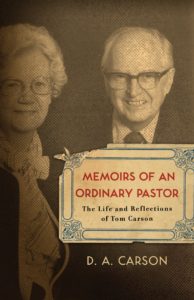 I had the opportunity to attend the Andrew Fuller Conference at Southern Seminary this past week. On my flight home, I read a book I’ve been looking forward to for years — D.A. Carson’s Memoirs of an Ordinary Pastor: The Life and Reflections of Tom Carson.
I had the opportunity to attend the Andrew Fuller Conference at Southern Seminary this past week. On my flight home, I read a book I’ve been looking forward to for years — D.A. Carson’s Memoirs of an Ordinary Pastor: The Life and Reflections of Tom Carson.
I was first drawn to this book through a couple of podcasts and/or interviews of Dr. Carson when it came out. The book recounts the rather ordinary, yet significant life of his father Tom, a Baptist pastor1 in French Quebec through the 1950s, 60s, and 70s. There are a number of reviews of the book out there and I’ll link to a few at the bottom of the post.… Read the rest
 Over the past few years, I’ve learned a little bit about Section 501 (c) (3) of the IRS tax code: the tax-exempt status for religious and other charitable organizations. I began blogging about these matters in a previous post Family, Finances, and the Faith: Nepotism In The Church. By the way, I’m still learning so please point out any errors in this post in the comments below and I’ll thank you in advance.
Over the past few years, I’ve learned a little bit about Section 501 (c) (3) of the IRS tax code: the tax-exempt status for religious and other charitable organizations. I began blogging about these matters in a previous post Family, Finances, and the Faith: Nepotism In The Church. By the way, I’m still learning so please point out any errors in this post in the comments below and I’ll thank you in advance.
If we survey history objectively, we have to admit that the Church in the United States enjoys a privileged relationship with the government compared to many other nations — tax exemptions on property and financial assets are not a Constitutional right (those are guaranteed to individuals) but a blessing bestowed by a government that was formed out of the nightmare of state-run, coercive churches that suppressed religious freedom.… Read the rest
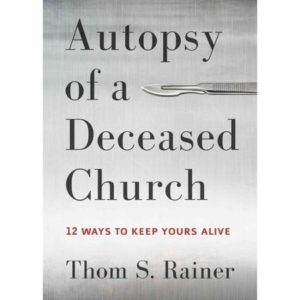 From Thom Rainer’s book, Autopsy of a Deceased Church, the author lists some tell-tale signs to alert us that our church is in trouble. Here are the most telling, in my opinion:
From Thom Rainer’s book, Autopsy of a Deceased Church, the author lists some tell-tale signs to alert us that our church is in trouble. Here are the most telling, in my opinion:
- “The church refused to look like the community. The community began a transition toward a lower socioeconomic class thirty years ago, but the church members had no desire to reach the new residents. The congregation thus became an island of middle-class members in a sea of lower-class residents.”
- “There was no attempt to reach the community.”
- “More and more emphasis was placed on the past.”
- “The percentage of the budget for members’ needs kept increasing.
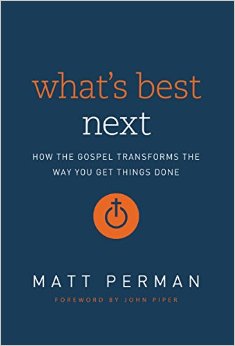 I suppose it’s fitting I write a review of Matt Perman’s book What’s Best Next (WBN) toward the end of a day that I’ve spent piddling, getting very little done, on the way to working myself up to settle down to watch a movie.
I suppose it’s fitting I write a review of Matt Perman’s book What’s Best Next (WBN) toward the end of a day that I’ve spent piddling, getting very little done, on the way to working myself up to settle down to watch a movie.
My cousin Nancy pointed me to What’s Best Next, while discussing our recent retirements. For Type A personalities or those of us who obsess over how much time we’re wasting, our first impulse is to prioritize and jump right into finding more time. That’s universal and, if you don’t believe me, just scroll through the thousands of productivity products and strategies on the web.… Read the rest
I’ve been struggling over the past year and a half, trying to get a routine down — to optimize my time and get some real work done. I am essentially self-employed now, even if I’m not earning a living by my efforts. Nearly forty years with the US Postal Service and twenty-four years as a bi-vocational pastor kept me working and focused, so there was an imposed structure to my day with objectives and goals to meet, as well as work to be done. Now, I have to plan my own workday, thankful that years of working for the USPS, Denise’s years of contracting and employment, the generosity of others, and personal planning have provided the financial foundation for labors of love that don’t necessarily pay.… Read the rest
So, I came across these 4 Tips For Dealing With Procrastination @ Challies Dot Com. Funny, I’ve never thought of myself as one of those slugs who can’t seem to get around to getting around to begin to start to get rolling on accomplishing some work. But, since retiring from two careers at roughly the same time in order to begin doing all those things I’ve always wanted to do… well, it’s been a bit more of a challenge to get going than I’d like to admit.
I’m happy to report that I’m finding myself on task and in the zone far more than I was a year ago and I have Tim to thank for this.… Read the rest
If you haven’t already read it, this is a fine book about cultivating healthy, Gospel relationships within the Church. I read Ken Sande’s first edition of The Peacemaker years ago and have to say this revised and updated Third Edition is greatly improved. I skimmed over my highlighted copy about a month ago and was pleasantly surprised to rediscover this gem, buried among so much treasure:
… Read the restPeople who use escape responses [to conflict] are usually intent on “peace-faking,” or making things look good even when they are not. (This is especially common in the church, where people are often more concerned about the appearance of peace than the reality of peace).
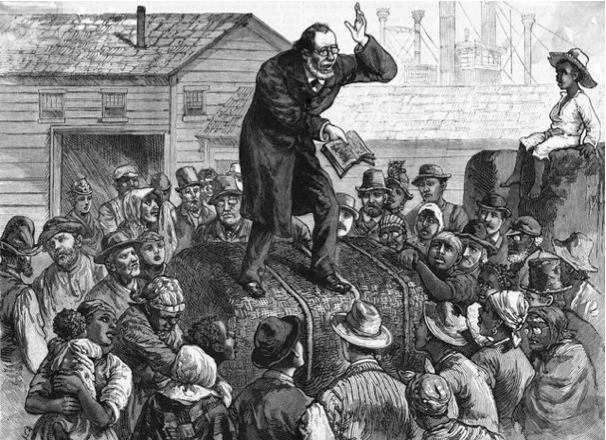 Occasionally, I provide pulpit supply, filling in for a pastor who needs a break for whatever reason. I’ve only done this a few times over the years, but always enjoy it.
Occasionally, I provide pulpit supply, filling in for a pastor who needs a break for whatever reason. I’ve only done this a few times over the years, but always enjoy it.
In July, I’ll be talking about the Gospel and Paul’s reminder to Christians at Corinth to stand in/on the Gospel message or “word” he had preached or “proclaimed” to them, years earlier:
… Read the restNow I would remind you, brothers, of the gospel I preached to you, which you received, in which you stand, and by which you are being saved, if you hold fast to the word I preached to you—unless you believed in vain. (1
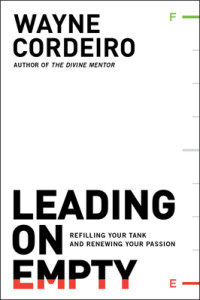 Leading on Empty by Wayne Cordeiro is a book for burnouts. I picked it up back in February of 2013, when I finally realized I was experiencing long-term exhaustion (the formal diagnosis). I was a classic case — I didn’t know I had arrived at burnout, until I was actually coming out of it. A friend pointed me to this text as a classic on the subject, specifically written for Christians.
Leading on Empty by Wayne Cordeiro is a book for burnouts. I picked it up back in February of 2013, when I finally realized I was experiencing long-term exhaustion (the formal diagnosis). I was a classic case — I didn’t know I had arrived at burnout, until I was actually coming out of it. A friend pointed me to this text as a classic on the subject, specifically written for Christians.
The book was not overly helpful for me, because I had stumbled into solutions or had recognized and addressed many of the symptoms already. It did help me to make sense of the troubled waters I’d just passed through and gave me a few tips or reminders to get back on course.… Read the rest
It is an old joke, one that is still told too often. You go up to your pastor and say, “I wish I had your job; you only have to work one hour each week.” It is likely your pastor will laugh or smile at your comment. In reality your pastor is likely hurt by your statement.
Or, put another way: Here’s a good-natured, self-deprecating jab via Dick Lucas:
“The Christian minister: six days invisible and one day incomprehensible.”
Personally? This one hit closest to home:
… Read the restMyth #7: The pastor’s workweek is low stress compared to others. I believe pastors have one of the most difficult and stressful jobs on earth.
Nope, you don’t want to believe everything you read. Christianity in America, particularly the Evangelical stream, is certainly under pressure from all sides. But, is the situation as dire as some like to think? Joe Carter takes on the doomsday crowd , beginning his factcheck on this nugget of conventional wisdom:
… Read the restIn a recent interview in which she announced she had joined the Episcopal Church, Rachel Held Evans said,
“Just about every denomination in the American church— including many evangelical denominations — is seeing a decline in numbers, so if it’s a competition, then we’re all losing, just at different rates.”
The Biblical Eldership Resources site has made one huge improvement: They’ve put the main navigation items right up front, so they’re just a click away!
Check it out at: BiblicalEldership.com | Providing biblically based resources to encourage the practice of Eldership..… Read the rest
It’s been said that the Bible is a treasure-trove of stories that translate into great film. Last night, I watched On The Waterfront for the second or third time and finally got it: The film is chock full of Biblical themes and Christ is exalted throughout this wonderful love story!
First, On The Waterfront is a story of young love. That’s what captivated me the first time around. This ironic romance involves a disgraced boxer and union thug, Terry, and Edie, the sister of a man who was murdered for exposing corruption on the waterfront. Edie doesn’t know that Terry was the one who set up her brother, Joey.… Read the rest
Character is king when it comes to church leadership. In fact, the best commentators on 1 Timothy 3 and Titus 1 will tell you that the qualities enumerated there don’t say as much about “what the elder1 does” as “who he is” and it all falls under the heading of Christian character. That’s why transparency, frank discussion, accountability, and honesty are a must within the leadership body and, then, between the leaders and the community. Garrett Kell writes:
… Read the restYour office as an overseer is contingent upon your character. And as you well know, holiness doesn’t just happen. It must be fought for.
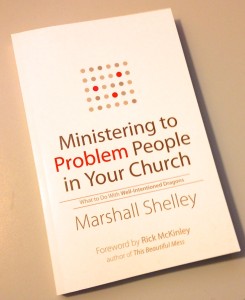 My new and improved edition of Ministering to Problem People in Your Church: What to Do With Well-Intentioned Dragons arrived in the mail last week and a quick perusal shows some needed updates and timely material in the original chapters. It also sports one of the most simple and attractive covers I’ve seen in a while (I’m a minimalist, in the tradition of the Swiss school).
My new and improved edition of Ministering to Problem People in Your Church: What to Do With Well-Intentioned Dragons arrived in the mail last week and a quick perusal shows some needed updates and timely material in the original chapters. It also sports one of the most simple and attractive covers I’ve seen in a while (I’m a minimalist, in the tradition of the Swiss school).
Marshall Shelley has added two new chapters, which reflect our times. First, he grapples with the emergence of the internet and the challenges of social media that didn’t exist when the book was first published back in 1994.… Read the rest
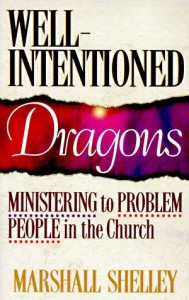 With my first post about Ministering to Problem People in Your Church: What to Do With Well-Intentioned Dragons, I wanted to kick off the series on a positive or constructive tack, rather than just whining or blaming. Every church, going all the way back to Corinth and beyond, has had its share of folks who pass over the threshold of acceptable or normal misbehaving and into those super-descriptive, unflattering Scriptural categories reserved for the worst cases: they are gossips, slanderers, divisive persons, judgmental and evil, wild waves, and blemishes on your love feasts.1 The Lord is not pleased with those who trouble the church. From… Read the rest
With my first post about Ministering to Problem People in Your Church: What to Do With Well-Intentioned Dragons, I wanted to kick off the series on a positive or constructive tack, rather than just whining or blaming. Every church, going all the way back to Corinth and beyond, has had its share of folks who pass over the threshold of acceptable or normal misbehaving and into those super-descriptive, unflattering Scriptural categories reserved for the worst cases: they are gossips, slanderers, divisive persons, judgmental and evil, wild waves, and blemishes on your love feasts.1 The Lord is not pleased with those who trouble the church. From… Read the rest
Get More Rings in Your Tree from The Gospel Coalition on Vimeo.
The Gospel Coalition has a number of good videos and this one is worth watching and not so much because of the people they name, who actually influenced them: when all is said and done they only name a few! Rather, what I found most valuable are the reasons why they urge us to read, watch or listen to a variety of Christian thinkers, leaders, and noteworthy historical figures, after reading our Bibles. The panel is mainly addressing preachers or leaders, but I think their advice is sound for any Jesus follower.… Read the rest
 Yeah, I’m really put off, too, when someone says, “you just have to read this.” But, if you’re leading the church in any capacity and especially if you are an idealistic young (or, not so young) church planter or minister, this book is a gem.
Yeah, I’m really put off, too, when someone says, “you just have to read this.” But, if you’re leading the church in any capacity and especially if you are an idealistic young (or, not so young) church planter or minister, this book is a gem.
I wish someone would have pointed me to it back in 1994, when it was first published. Of course, at that time I probably wouldn’t have thought it that helpful. After all, I had my Bible and the Holy Spirit living inside of me. I was part of a young, growing movement of Christians, multiplying and establishing on-fire churches and ministries.… Read the rest






